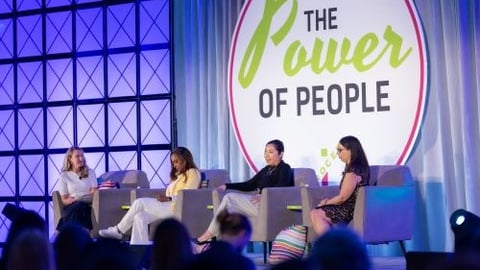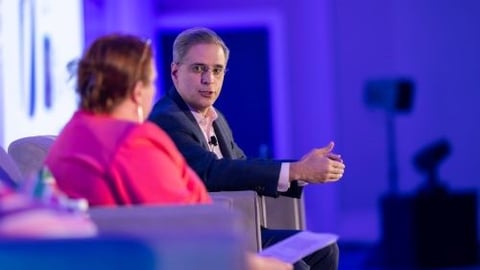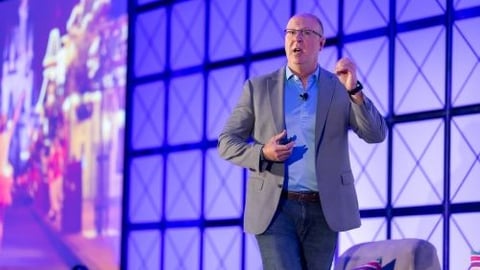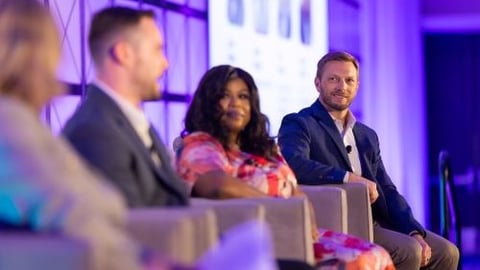How to Become a Chief Customer Officer
When her session was introduced at Progressive Grocer’s Grocery Impact event last week in Orlando, Fla., Amy McClellan, EVP and chief customer officer at SpartanNash, (as well as a two-time Top Women in Grocery honoree and GenNext award recipient) was described as being “focused on driving sales growth and the wholesale segment and … responsible for customer relationships, including independent grocers,” with additional duties including “oversight of field merchandising, sales, operations, customer service and value-added services to help SpartanNash customers succeed in the communities they serve.” That description didn’t mention how McClellan attained her position, however, so she set out to give attendees the details of her rise at the food solutions company.
McClellan started out at the tender age of 16 as a cashier at Martin’s Super Markets, a South Bend, Ind.-based grocery store chain that was acquired by SpartanNash in 2019. “I’ve had the unique opportunity to grow up in grocery, and over the course of my career, my passion for grocery is even stronger with the new communities that we serve,” she noted.
Referencing her best friend, Michelle, who started at Martin’s the same year she did and is currently a store director with the organization, McClellan said: “She’s who I call when I want to know what’s really going on. … As we take on new responsibilities as leaders, it’s so important to keep our connection with the front line and have those great sources for information and insights that can help you change the ways in which your teams work together.”
She added that her time at retail in various roles – including as a personal shopper in a very early online shopping program at Martin’s, Fast Groceries – enabled her “to get a world of unpredictable experiences, which I know all of you at retail are very familiar with how unpredictable our business can be.”
Further, she pointed out that “what is so important about all that experience I gained in the Martin’s stores and the organization was really about how I leveraged that experience.” Having gone off to college to earn marketing and advertising degrees and intern at an ad agency, McClellan made the pivotal decision to quit the agency to take an office manager role at Martin’s. Why? “Because I got to lead people,” explained McClellan, “and that experience leading people was super-invaluable. I spent 10 years in the Martin’s office learning all aspects of the business as a marketing specialist. I was supporting the small executive leadership team on things like market development, store remodels. I worked with the controller on all kinds of business development ideas and opportunities. It was a great way to get a lot of experience.”
This experience allowed her to move up at the company, including a role leading her peer group of colleagues, who had been in the business longer than she had and were all male. “Because I had worked alongside those folks for so long, we had created trust and I could get them to do new and different things that no one else could figure out how to get them to do,” recounted McClellan, “and that is ultimately how I learned how to lead people, through those experiences.”
[RELATED: Kroger Exec Traces Her Path to Career Success]
When Martin’s was eventually acquired by SpartanNash, it went from being a privately held family company with 20 stores to part of a much larger organization, but McClellan asserted that what didn’t change amid the transition was the culture. “It’s not what you sell, it’s what you stand for – something I believe in every single day,” she emphasized. “I sell things, but it’s ultimately what I stand for. The way I treat people, the way I create solutions, the way we at SpartanNash create solutions. It’s what we stand for that will help us grow and be successful in the future.”
She went on to describe SpartanNash’s “People-First culture,” which consists of “four core behaviors that we leverage to get folks thinking about the behaviors that they should display every single day: We serve, we create solutions, we win, we have fun. These core behaviors take me all the way back to my beginnings at Martin’s Super Markets, and I think they’re really fundamental to our industry generally.”
According to McClellan, these four core competencies “really make a difference in our ability to deliver results. And it’s not just about writing ’em down or reading ’em, it’s putting them into practice to get good at these sorts of things. You actually have to practice them, and that only comes with experience.”
[RELATED: TWIG Trailblazers Past and Present Share Insights at Grocery Impact]
She wrapped things up with a few “tips and tricks” for attendees to achieve their own goals: make your goals and aspirations clear and have a laser focus on delivering results; if you aspire to lead teams experience in the field is priceless; figure out how to get into the inner circle of the great leaders in your organization, and find mentorship from them; assemble your tribe, create a growth culture, and let your leaders shine; and take advice from your mom or some other trusted figure that basically boils down to the Golden Rule of treating others how you want to be treated.
Answering questions from the audience, McClellan affirmed that it’s okay to make mistakes, since “no risk, no reward,” and then, when asked whether she would regret having spent basically her entire working life at retail, she gave a telling response.
“I don’t think I would be in the business if I hadn’t had the opportunity to experience lots of different things throughout my career,” she told the questioner. “Just as I was getting bored in one role, I would get offered a new opportunity, or I would think of something that we could do as an organization to get better. So I don’t think I’ll regret it, because I’ve learned so much, and it always links back to the people and the communities we serve.”






